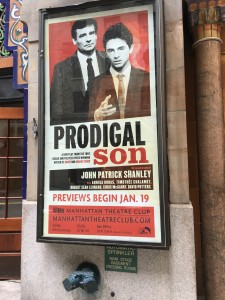Lucas Hnath has written the best play David Mamet didn’t. That assessment may initially appear to be damning with faint praise. Yet, Hnath has exceeded the reach of his predecessor in several key elements.
Currently coming to the end of it’s run at New York Theatre Workshop, Hnath’s Red Speedo details the late career hopes of professional swimmer Ray (played with off-kilter intensity by Alex Breaux). The plot revolves around whether or not he took performance-enhancing drugs to aid him for his Olympic trials. The moral quagmire encompasses Ray, his brother/manager Peter (Lucas Caleb Rooney), his coach (Peter Jay Fernandez), and ex-girlfriend Lydia (Zoë Walters). Hnath shares Mamet’s ability to bring his drama alive with staccato lines spat out like frantic machine-gun fire from Apocalypse Now. He also dramatizes the moral rot that can pervade an institution and how the appearance of propriety often becomes more important than actual propriety.
Hnath excels in some compelling ways. First, in Lydia, Hnath has created a fully realized female character. Lydia is not an idea or caricature or plot device. As embodied by Walters, Lydia — even though she appears in a single scene — is fully a part of the tapestry of the world. Her reach — the effect that she has on the narrative outcome — far greater than her stage time might at first indicate. Morally damaged like the other characters, Zoë is the one who tries to find a path — stumbling in the dark as she does — to something more ethical, something that allows her to leave her past behind.
Second, the playwright carefully weaves the personal and the professional together. Choices flow organically from character, from damaged pasts, from desperation. If a character chooses a morally questionable path, the drive emanates as much from the pains of failures, the fear of abandonment and loss, and the desire to escape errors. Greed is not so much a motive as fear. That makes them more understandable, more relatable. We can bring them closer to us, rather than judging them from the distance. Of course, once we have brought Ray into our hearts — when we think he is a jerky, somewhat stupid, somewhat deluded guy — then Hnath brings down the hammer and we are confronted by the monstrosity of Ray’s actions.
And that, finally, leads to Hnath’s greatest playwriting strength: the ability to surprise. None of the salesmen of Glengarry Glen Ross are particularly likable. We see them for what they are from the start. And when they fall upon one another in the second act, it is entertaining to be sure, but the audience is kept at a distance from them; we can happily feel morally superior to them because we are removed from them. Not so with Ray. Hnath sets his drama so that we believe Peter to be the fast-talking lawyer with the ethics of a deranged squirrel while Ray has just been along for the ride but is ultimately a sweet kid, redeemable. As the play unfolds, we see different shades of both that reveal complexity and nuance to both. The playwright carefully reveals details that leave us, at the end, with the judgment of Ray that is starkly different, starkly darker than where we started.
Director Lileanna Blain-Cruz stages the drama brilliantly, and the transformation of the New York Theatre Workshop space into the side of a swimming pool serves the work admirably. Fernandez excels as the Coach, and he lays bare the contradictions of his character as he must navigate the shoals of which moral compromises to make and which to avoid.

